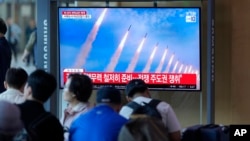A senior United Nations official said Friday that the organization remains “deeply concerned” about growing tensions on the Korean Peninsula, following North Korea’s latest attempted launch of a spy satellite and firing of ballistic missiles.
“We encourage all member states, and members of this council, to seek unity, and for all parties to create an environment conducive to dialogue and cooperation,” U.N. assistant political chief Khaled Khiari told a meeting of the Security Council. “At this particularly difficult moment in securing global peace and security, it is imperative to de-escalate the rising tensions on the Korean Peninsula.”
Several council members, including the United States, Japan and South Korea, requested the meeting after North Korea unsuccessfully launched a spy satellite on May 27. That was followed on Thursday by the firing of a barrage of ballistic missiles toward its eastern sea.
Washington’s envoy said Pyongyang is advancing its prohibited weapons program “at an alarming rate,” and has launched more than 100 ballistic missiles since the beginning of 2022.
“Each of these launches — successful or not — is a flagrant violation of U.N. Security Council resolutions,” U.S. Deputy U.N. Ambassador Robert Wood said. “Each launch informs the DPRK of its capability gaps and allows Pyongyang to further advance its weapons programs.”
DPRK is the abbreviation for North Korea's official name: the Democratic People's Republic of Korea.
While the spy satellite exploded shortly after it was fired, an earlier launch in November was successful. In December, Pyongyang announced that it plans to launch three more military satellites this year.
North Korea’s U.N. envoy was defiant.
“We make it clear once again that the DPRK’s possession of space reconnaissance capabilities is an independent right that can never be abandoned or bartered for anything else,” Ambassador Kim Song told the council. “It is an important undertaking of absolute necessity for defense of the state sovereignty and legitimate self-defense.”
North Korea’s Monday launch took place just hours after a rare trilateral dialogue wrapped up in Seoul among China’s premier, Japan’s prime minister and South Korea’s president, with a call for the denuclearization of the Korean Peninsula.
Chinese Ambassador Fu Cong said Friday it is imperative all parties adopt a rational and practical approach, swiftly resume dialogue, act calmly and not intensify tensions.
He expressed concern about a planned U.S. joint military exercise on the peninsula planned for August.
“Such a plan will only increase tensions and the risk of war and turmoil on the peninsula, making the goal of long-term stability ever more elusive,” he said. “China opposes the plan.”
South Korea’s ambassador said Pyongyang’s nuclear policy and its rhetoric are becoming increasingly hostile and aggressive towards his country.
“Pyongyang no longer regards its nuclear arsenal as just a deterrent against the U.S., but instead as a means to attack my country, the Republic of Korea, which the North Korean leader himself called in January not a fellow nation but, ‘the most hostile foreign enemy to be subjugated,’” Ambassador Hwang Joon-kook said.
Hwang added that North Korea announced Friday that the multiple short-range ballistic missiles it fired on Thursday were aimed at his country, and that Pyongyang says it will not hesitate to carry out a preemptive attack on “the enemies.”
“Faced with these menacing threats, the Republic of Korea has to take all necessary measures to protect national security and our people by maintaining a robust combined defense and deterrence posture,” Hwang said.
Russia-DPRK military cooperation
The United States and several other council members also raised, not for the first time, Russia’s procurement of weapons and munitions from North Korea for use in its war in Ukraine, in violation of the council’s own sanctions and arms embargo.
“The DPRK has also unlawfully transferred dozens of ballistic missiles and over 11,000 containers of munitions to aid Russia’s war against Ukraine, prolonging the suffering of the Ukrainian people,” Ambassador Wood said.
“We continue to monitor closely what North Korea gains in return,” said Ambassador Kazuyuki Yamazaki of Japan. “We cannot let the current situation become the new normal.”
Both Moscow and Pyongyang have previously denied the weapons allegations.
Several council resolutions prohibit North Korea from developing a ballistic missile program, as well as ban it from exporting arms or related material to other states.
Russia’s envoy said accusations that their activity with North Korea is illegal are “absolutely unfounded” and Moscow is simply cooperating with a friendly neighbor.
“The cooperation between Russia and the DPRK is exclusively constructive and lawful in nature,” Deputy Ambassador Anna Evstigneeva said. “It doesn’t threaten anyone or violate anyone, and it will continue.”
On March 28, Russia used its council veto to shut down the panel of experts who monitor implementation of the Security Council’s sanctions on North Korea, drawing criticism that it was trying to shield itself from scrutiny.
Since 2006, the council has adopted several sanctions resolutions intended to limit North Korea's access to funds and materials for its illicit nuclear and ballistic missile weapons programs. The council created the panel of experts in 2009, and since then they have documented implementation and alleged violations of council resolutions. But despite tough sanctions, Pyongyang continues to advance its weapons programs.
VOA Seoul Correspondent William Gallo contributed to this report.















